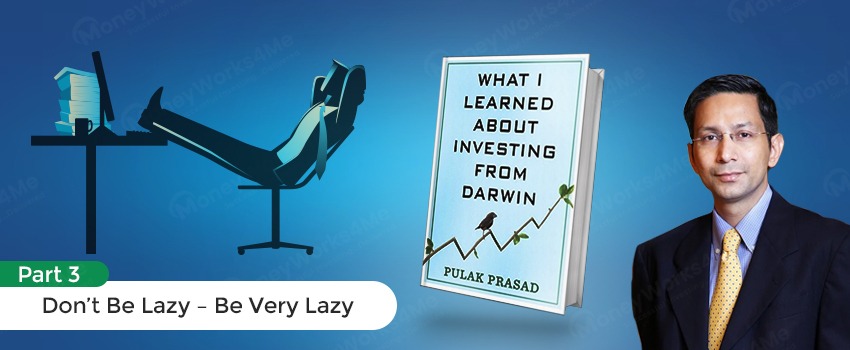The insights gleaned from the book have been skilfully dissected and presented across three distinct articles. Immerse yourself in the first installment of our comprehensive summary, where we distill the essence of Part Three – Don’t Be Lazy – Be Very Lazy.
In the short term, the market scenario may spell doom and may cause an investor to sell high-quality businesses. Conversely, high valuations may signal excess euphoria, causing an investor to sell a high-quality business. In both cases, Pulak Prasad recommends that an investor should do nothing. An investor should only sell if there has been permanent and irreversible damage to the business or if the capital allocation quality worsens.
Laziness is important for an investor. Contrary to Darwinism, evolution can be faster when measured over shorter periods of time and slower over longer periods. Similarly, businesses seem to go through many changes over the short period, while remaining extremely stable over years or decades. Empirical evidence shows that high-quality businesses remain successful over extended periods of time, while low-quality businesses tend to remain unsuccessful in the long run. Investors must take advantage of short-term fluctuations in prices to buy businesses at good valuations. These situations are rare and will attract the lazy investor. Moreover, a lazy investor would also avoid selling such businesses on merely valuation. Action is appreciated only when selling a business where capital allocation becomes questionable or if there has been irreparable damage to a business.
Nalanda prefers to be a permanent owner of businesses, which means not selling regardless of valuations. The richest people in the world are generally those that have refused to sell because they understand the power of compounding. Even a small advantage over peers can lead to a significant advantage over a long period of time. Such benefits can only be realized over extensive holding periods. Pulak Prasad highlights that Nalanda’s success is not reliant on its buying decisions but more importantly on its decision to not sell high-quality businesses.
Conclusion Pulak Prasad draws extensively from Darwin’s theory of evolution and various other researchers in this field. While the contrast may raise initial curiosity, the quality of examples and the parallels drawn are astounding. In a way, companies have been considered to be living organisms, as they exist and evolve over time, similar to actual living organisms. For any investor, this book is a must-read.
Missed Part One? Catch up now – click here!
Missed Part Two? Catch up now – click here!
Already have an account? Log in
Want complete access
to this story?
Register Now For Free!
Also get more expert insights, QVPT ratings of 3500+ stocks, Stocks
Screener and much more on Registering.
































Comment Your Thoughts: